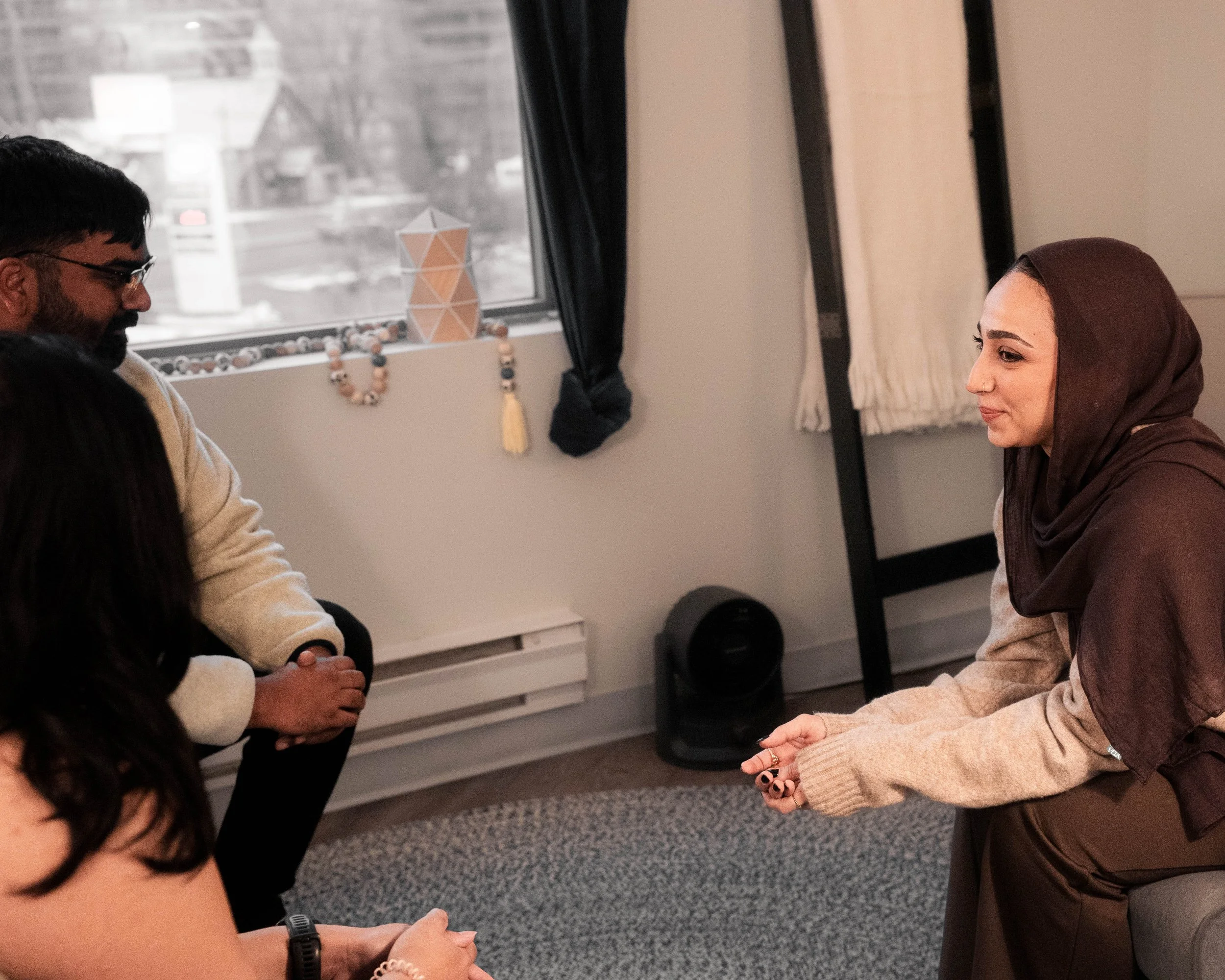Therapy That Feels Real
I work with couples and individuals, including BIPOC, Muslim, refugee, and young adult clients, to create therapy that feels practical, safe, and supportive. Here’s what you can expect:
Safe and Supportive: Sessions move at a pace that feels right for you, with your needs guiding the process.
Culturally and Faith-Informed: Your identity, culture, and beliefs are included and respected in therapy.
Warm and Direct: I connect with you in a straightforward and approachable way so therapy feels real and human.
Adapted to You: I tailor my approach to fit your personality, goals, and preferences.
Clear and Honest Feedback: I help you see patterns, gain insight, and understand your challenges more clearly
Play and Humour: I value moments of humour and lightness as part of the healing process..
Holistic: I consider your past, present, future, and the systems around you that influence your experiences.
Compassionate and Curious: I stay curious, and invite you to be curious about your process with compassion.
My Areas of Focus
-
Navigating a committed relationship with another person can be difficult for many reasons. Sometimes this is due to life circumstances, past traumas or lack of communication and understanding of one another. This can lead to things like infidelity, lack of intimacy and dissatisfaction in the relationship. Many times, with the right help, these dynamics can change and can bring a new sense of meaning and connectedness.
-
We are surrounded by relationships in our life and these can become strained, whether we are at work, or in the community, or with our families. Sometimes we choose to repair these and sometimes we choose a different path. It is important to recognize and be purposeful with the choices we make.
-
Anxiety is a normal process for all of us. However, it can start to interfere in our lives when we do not understand what it is and what it is trying to tell us. Anxiety can look like many things but it is usually when we feel scared and helpless, and can manifest as lack of sleep, inability to concentrate and panic. It is important to understand how anxiety works, and eventually how to make friends with it
-
Simply put, trauma is when we feel unsafe in our bodies. This happens after we have experienced an event, or series of events in our lives that leave us feeling overwhelmed and unable to cope. Trauma can create emotional and behavioral responses that are repeated and usually recreate the same pain that we are trying to escape. This can be confusing and scary and can leave us in a place of despair and helplessness. Gaining awareness can allow us to take back control of our lives and teach our bodies to be safe again.
-
Black, Indigenous and People of Colour (BIPOC) experience life in a way that can be oppressive within the Canadian and Western system. It is essential to acknowledge these power dynamics and the impact of intergenerational trauma that has been passed on from colonialism. As a person of colour myself, I aim to offer a space where exploring these nuances is welcomed and encouraged.
-
Therapy Modalities I Use
-
I draw from evidence-based modalities including Emotion-Focused Therapy (EFT), Cognitive Behavioral Therapy (CBT), Dialectical Behavior Therapy (DBT), and Cognitive Processing Therapy (CPT). These approaches allow me to address emotions, thoughts, coping skills, and trauma in a way that is tailored to your unique experience and goals.
-
I use Emotion-Focused Therapy (EFT) to help couples identify and express their deeper emotions, fostering greater empathy and connection. Through the Gottman Method, I guide couples in building practical communication and conflict-management skills grounded in research on what makes relationships thrive.
-
Trauma-informed therapy is an approach that integrates knowledge about trauma into all aspects of treatment, aiming to avoid re-traumatization and promote healing.
-
Socio-culturally attuned therapy acknowledges the influence of social and cultural contexts on an individual's experiences and well-being. It emphasizes understanding and integrating clients' cultural backgrounds, identities, and social environments into the therapeutic process. This approach aims to provide culturally sensitive and inclusive care, promoting respect and empowerment for diverse clients.
-
EMDR (Eye Movement Desensitization and Reprocessing) is an evidence-based therapy that helps process and heal from past traumatic experiences. By guiding you through specific eye movements or other forms of bilateral stimulation, EMDR supports your brain in reprocessing difficult memories, reducing their emotional impact, and promoting healthier ways of coping. It’s effective for trauma, anxiety, and many other challenges, helping you move toward healing and relief.
-
Islamic psychotherapy integrates Islamic principles with therapeutic practices to address mental health from a spiritual lens. As a practicing Muslim, I see great value in incorporating faith as a source of strength and support, and I can help you draw on this if this is if you are interested in this approach.

